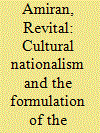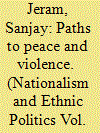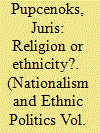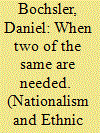| Srl | Item |
| 1 |
ID:
114199


|
|
|
|
|
| Publication |
2012.
|
| Summary/Abstract |
Regarding culture as the very basis of the concept of a nation, this article reflects on cultural nationalism's attitude towards the idea of a nation-state and national-political life. I will suggest that cultural nationalism is a concept that inevitably invokes the aspiration that art will overcome political life, undermining its role to provide the soon-to-be citizens with an adequate arena on which to contest their ethics. Thus, cultural nationalism might prevent politics from being involved in questions of identity and may imply some questionable consequences regarding democratic values such as individual autonomy. Hence, cultural nationalism keeps open the option to contradict its own intrinsic postulation that aims for self-sovereignty. This claim will be demonstrated with the case study of the Jewish national movement and more specifically through the examination of the writings of two important literary personae within it: David Frishman and Micha Joseph Berdichevski.
|
|
|
|
|
|
|
|
|
|
|
|
|
|
|
|
| 2 |
ID:
114201


|
|
|
|
|
| Publication |
2012.
|
| Summary/Abstract |
This article challenges the common wisdom that national identification always leads to xenophobic attitudes toward immigrants. Analyzing cross-national survey data from dozens of countries reveals how the relations between national identification and xenophobic attitudes toward immigrants vary according to country citizenship policy. The more inclusive the citizenship regime, the weaker the relations are between national identification and xenophobia. In fact, in countries with full jus soli law there are, on average, negative relations between national identification and xenophobia while in other countries there are positive relations between the two. These findings are used to discuss the ways conceptions of nationhood are institutionalized in citizenship policy from a socio-psychological perspective.
|
|
|
|
|
|
|
|
|
|
|
|
|
|
|
|
| 3 |
ID:
114197


|
|
|
|
|
| Publication |
2012.
|
| Summary/Abstract |
Democratization has been heralded as both a "curse" and "cure" for ethnic conflict. Using a comparative analysis of ethnic conflicts in Senegal and Nicaragua, this article makes the case that the breadth of accommodation provided by a central government following democratization is a key variable that can provide a deeper understanding of why conflict sometimes worsens and sometimes ameliorates. By adopting a framework that conceptualizes the range of accommodation provided to territorial minority ethnic groups in advanced capitalist democracies as falling into three general categories, "loyalty," "voice," and "recognition," the article illustrates that using a combination of these three strategies helped Nicaragua quell violent ethnic conflict. On the other hand, the conflict in Senegal continued because the newly democratic government refrained from using strategies to provide "voice" and "recognition" for the Diola minority.
|
|
|
|
|
|
|
|
|
|
|
|
|
|
|
|
| 4 |
ID:
114198


|
|
|
|
|
| Publication |
2012.
|
| Summary/Abstract |
This article argues that American Arab-Muslim political mobilization in response to conflicts abroad is predominantly influenced by their ethnic divisions and sectarian cleavages rather than shared religious commonalities. The article provides an analysis of Detroit's Arab-Muslim reactions to the conflicts in the Middle East from 2001-2009. It shows that while Arab-Muslims were particularly active in expressing their views on the 2006 Israel-Hezbollah War and the winter 2009 Israeli incursion into the Gaza Strip, the Iraq War of 2003 did not generate noteworthy activism. Varied expressions regarding different Middle Eastern conflicts are predominantly influenced by the different national origins of various Arab populations.
|
|
|
|
|
|
|
|
|
|
|
|
|
|
|
|
| 5 |
ID:
114200


|
|
|
|
|
| Publication |
2012.
|
| Summary/Abstract |
Parties of ethno-regional minorities have been created in a large number of ethnically diverse countries, but sometimes one such party is not enough. While previous work has investigated the consequences of intragroup party competition, this study looks at the causes of internal political diversification of minority groups. In states with multiple levels of governments, intra-ethnic rival parties emerge if minorities are local majorities in certain regions. Intra-ethnic party competition is limited, however, through the national electoral system, and especially high legal thresholds can restrict minority parties. This results in complex interaction terms of the territorial settlement structure of ethnic minorities and different types of electoral systems. The empirical analysis relies on Boolean Algebra (csQCA) and on a new cross-national dataset of 19 postcommunist democracies in Europe, counting 123 ethnic minorities.
|
|
|
|
|
|
|
|
|
|
|
|
|
|
|
|